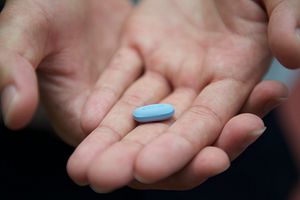The Thai Red Cross Anonymous Clinic (TRCAC) sits nestled back from a busy street in Bangkok, Thailand. This globally renowned institution is a familiar place for Jonas Bagas, who visits the leafy compound regularly. Jonas lives in Manila in the Philippines, but he comes here because he is taking oral pre-exposure prophylaxis or PrEP, which for the moment in Asia is only available at TRCAC. In other countries, people taking part in a PrEP study may also be able to access it.
“I hope that it becomes available in the Philippines soon and will be provided by the government,” said Jonas. The 37-year-old is gay and an activist for lesbian, gay, bisexual and transgender (LGBT) rights. He has been on PreP since July.
“One reason why I started was because I had a sexual partner who was HIV-positive,” said Jonas, who gets the medication and recommended HIV tests and check-ups on trips to Thailand, which he visits frequently for work.
PrEP is the use of antiretroviral medication in the form of a daily pill to prevent people from acquiring HIV. It has shown up to 90 percent percent effectiveness in preventing the transmission of HIV among people at substantial risk, including gay men and other men who have sex with men (MSM), HIV negative people whose partners are living with HIV, transgender women and people who inject drugs.
“On a personal level, I guess like any average gay guy I go online to look for hook-ups, to look for friends and to meet people. And online, I am pretty open about my decision to use PrEP,” said Jonas.
Much of Asia, including the Philippines has a severe HIV epidemic among the MSM community. In some mega-cities, including Bangkok and Jakarta, HIV prevalence among MSM ranges between 15 percent and 30 percent. Projections indicate that MSM could make up half or more of all new HIV infections in Asia by 2020.
Since the end of 2014, TRCAC has begun offering PrEP to clients, including people like Jonas, who do not reside in Thailand. The project is called PrEP-30 and is self-sustainable, because users are charged $1 a day for a daily supply of pills, along with the recommended counselling and health evaluations. PrEP is only for people who are HIV-negative, so it is recommended that users not only undergo an initial check up and test for HIV, but also for other sexually transmitted infections as well as liver and kidney function tests. After the initial month, users need to repeat the evaluation and after that return for tests every three months.
The most common mild side-effects are nausea, headache and weight loss in the first month, but no serious toxicity has been observed during PrEP trials.
“I find a huge urge to sleep right after taking PrEP, but since I take it at night, that’s not a huge minus,” said Jonas.
While, adherence and regular HIV-testing present challenges for the scaling up of PrEP use, researchers find it is a breakthrough in HIV prevention.
“We have been waiting quite a long time to get an HIV prevention method that you can use in privacy, without anxiety and PrEP is really the answer to that,” said Dr. Nittaya Phanuphak, Chief, Prevention Department, Thai Red Cross AIDS Research Centre.
Consistent condom use remains low in Asia. In most major cities less than half of MSM are using condoms consistently, which is far too low to have an impact on stopping the AIDS epidemic. UNAIDS recommends PrEP as an additional prevention tool for people at substantial risk of HIV exposure and who are ready to have regular HIV testing.
“The numbers say it all. We can not stop new HIV infections in gay men and other men who have sex with men if we stick to business as usual,” said Steve Kraus, Director of UNAIDS Regional Support Team for Asia and the Pacific. “PrEP answers an unmet need and expands the prevention options for people at substantial risk of HIV. We need to scale up PrEP as an additional effective HIV prevention intervention.”
PrEP does not prevent other sexually transmitted infections and is not a contraceptive, so health experts say it is best integrated with other sexual and reproductive health services, including condoms.
So far only the United States has approved the use of PrEP for HIV prevention. Surveys of potential users in Asia show that there is low awareness of PrEP and little belief in its efficacy. Recently in Bangkok, experts and MSM community members held the first meeting of its kind in Asia, which looked at how to roll-out PrEP across Asia. The meeting was organized by the Asia Pacific Coalition on Male Sexual Health (APCOM).
“APCOM’s role is to ensure that our community know the correct information on PrEP and can advocate for its inclusion at the national level,” said Midnight Poonkasetwattana, APCOM’s Executive Director.
Jonas believes that PrEP should be a choice for everyone at higher risk of HIV. He said, “Some people suggest that by taking PrEP I am promoting promiscuity, but that’s also how the public reacts when we promote condoms for gay men. It only shows how stigmatized male-to-male sex is. For me, PrEP is about making an informed choice for your health and being able to enjoy your sex life.”
Saya Oka is based in Bangkok and is the Communications Adviser for UNAIDS Regional Support Team for Asia and the Pacific.
































